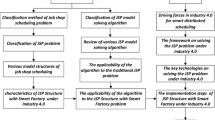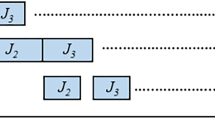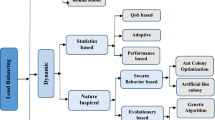Abstract
The focus of this paper is to analyze unrelated parallel-machine resource allocation scheduling problem with learning effect and deteriorating jobs. The goal is to find the optimal sequence of jobs and the optimal resource allocation separately for minimizing the cost function including the total load, the total completion time, the total absolute deviation of completion time and the total resource cost. We show that the problem is polynomial time solvable if the number of machines is a given constant.
Similar content being viewed by others
References
Bagchi UB (1989) Simultaneous minimization of mean and variation of flow-time and waiting time in single machine systems. Oper Res 37:118–125
Biskup D (2008) A state-of-the-art review on scheduling with learning effects. Eur J Oper Res 188:315–329
Cheng TCE, Wu C-C, Lee W-C (2008) Some scheduling problems with deteriorating jobs and learning effects. Comput Ind Eng 54:972–982
Eren T (2009) A bicriteria parallel machine scheduling with a learning effect of setup and removal times. Appl Math Model 33:1141–1150
Gawiejnowicz S (2008) Time-dependent scheduling. Springer, Berlin
Geyik F, Dosdoǧru AT (2013) Process plan and part routing optimization in a dynamic flexible job shop scheduling environment: an optimization via simulation approach. Neural Comput Appl 23:1631–1641
Graham RL, Lawler EL, Lenstra JK, Rinnooy Kan AHG (1979) Optimization and approximation in deterministic sequencing and scheduling: a survey. Ann Discrete Math 5:287–326
Hsu C-J, Kuo W-H, Yang D-L (2011) Unrelated parallel machine scheduling with past-sequence-dependent setup time and learning effects. Appl Math Model 35:1492–1496
Hsu C-J, Yang D-L (2014) Unrelated parallel-machine scheduling with position-dependent deteriorating jobs and resource-dependent processing time. Optim Lett 8:519–531
Hsu C-J, Yang S-J, Yang D-L (2011) Two due date assignment problems with position-dependent processing time on a single-machine. Comput Ind Eng 60:796–800
Huang X, Wang M-Z, Ji P (2014) Parallel machines scheduling with deteriorating and learning effects. Optim Lett 8:493–500
Jiang Z, Chen F, Kang H (2013) Single-machine scheduling problems with actual time-dependent and job-dependent learning effect. Eur J Oper Res 227:76–80
Kanet JJ (1981) Minimizing variation of flow time in single machine systems. Manag Sci 27:1453–1459
Lu Y-Y, Wang J-J, Wang J-B (2014) Single machine group scheduling with decreasing time-dependent processing times subject to release dates. Appl Math Comput 234:286–292
Mor B, Mosheiov G (2011) Total absolute deviation of job completion times on uniform and unrelated machines. Comput Oper Res 38:660–665
Okołowski D, Gawiejnowicz S (2010) Exact and heuristic algorithms for parallel-machine scheduling with DeJong’s learning effect. Comput Ind Eng 59:272–279
Panwalkar SS, Rajagopalan R (1992) Single machine sequencing with controllable processing times. Eur J Oper Res 59:298–302
Pinedo M (2002) Scheduling: theory, algorithms, and systems, upper saddle river. Prentice-hall, Upper Saddle River
Rudek R, Rudek A, Kozik A (2013) The solution algorithms for the multiprocessor scheduling with workspan criterion. Expert Syst Appl 40:2799–2806
Shabtay D, Steiner G (2007) A survey of scheduling with controllable processing times. Discrete Appl Math 155:1643–1666
Shabtay D, Steiner G (2008) The single-machine earlinesstardiness scheduling problem with due date assignment and resource-dependent processing times. Ann Oper Res 159(1):25–40
Wang J-B (2006) A note on scheduling problems with learning effect and deteriorating jobs. Int J Syst Sci 37:827–833
Wang J-B (2010) Single-machine scheduling with a sum-of-actual-processing-time-based learning effect. J Oper Res Soc 61:172–177
Wang J-B, Hsu C-J, Yang D-L (2013) Single-machine scheduling with effects of exponential learning and general deterioration. Appl Math Model 37:2293–2299
Wang J-B, Liu L, Wang C (2013) Single machine SLK/DIF due window assignment problem with learning effect and deteriorating jobs. Appl Math Model 37:8394–8400
Wang J-B, Wang M-Z (2011) Worst-case behavior of simple sequencing rules in flow shop scheduling with general position-dependent learning effects. Ann Oper Res 191:155–169
Wang J-B, Wang M-Z (2012) Single-machine scheduling with nonlinear deterioration. Optim Lett 6:87–98
Wang J-B, Wang M-Z (2012) Single-machine scheduling to minimize total convex resource consumption with a constraint on total weighted flow time. Comput Oper Res 39:492–497
Wang X-R, Wang J-J (2013) Single-machine scheduling with convex resource dependent processing times and deteriorating jobs. Appl Math Model 37:2388–2393
Wang X-Y, Wang J-J (2013) Scheduling problems with past-sequence-dependent setup times and general effects of deterioration and learning. Appl Math Model 37:4905–4914
Wang X-Y, Wang J-J (2014) Scheduling deteriorating jobs with a learning effect on unrelated parallel machines. Appl Math Model 38:5231–5238
Wang J-B, Wang J-J (2014) Single machine group scheduling with time dependent processing times and ready times. Inf Sci 275:226–231
Wang J-B, Wang M-Z and Ji P (2012) Scheduling jobs with processing times dependent on position, starting time and allotted resource, Asia-Pacific Journal of Operational Research, vol. 29, Article ID 1250030
Wang D, Wang M-Z, Wang J-B (2010) Single-machine scheduling with learning effect and resource-dependent processing times. Comput Ind Eng 59:458–462
Weckman G, Bondal AA, Rinder MM, Young WA II (2012) Applying a hybrid artificial immune systems to the job shop scheduling problem. Neural Comput Appl 21:1465–1475
Wei C-M, Wang J-B, Ji P (2012) Single-machine scheduling with time-and-resource-dependent processing times. Appl Math Model 36:792–798
Xu Y-T, Zhang Y, Huang X (2014) Single-machine ready times scheduling with group technology and proportional linear deterioration. Appl Math Model 38:384–391
Yang D-L, Kuo W-H (2009) Single-machine scheduling with both deterioration and learning effects. Ann Oper Res 172:315–327
Yin, Y, Cheng TCE, Wu C-C (2014) Scheduling with time-dependent processing times. Math Probl Eng. Article ID 201421
Yin Y, Cheng TCE, Wan L, Wu C-C, Liu J (2015) Two-agent single-machine scheduling with deteriorating jobs. Comput Ind Eng 81:177–185
Yin N, Kang L, Ji P, Wang J-B (2014) Single machine scheduling with sum-of-logarithm-processing-times based deterioration. Inf Sci 274:303–309
Yin N, Kang L, Wang X-Y (2014) Single-machine group scheduling with processing times dependent on position, starting time and allotted resource. Appl Math Model 38:4602–4613
Yin Y, Wu W-H, Cheng TCE, Wu C-C (2015) Single-machine scheduling with time-dependent and position-dependent deteriorating jobs. Int J Comput Integr Manuf 28:781–790
Zhang G-Q, Wang J-J and Liu Y-J (2014) Scheduling jobs with variable job processing times on unrelated parallel machines. Sci World J, Article ID 242107
Acknowledgments
This research was supported by the Science and Technology Development Project of Jilin Province of China (Grant No. 20140520057JH), The Hong Kong Polytechnic University (Project 4-BCBJ) and the National Natural Science Foundation of China (Grant No. 71471120).
Author information
Authors and Affiliations
Corresponding author
Rights and permissions
About this article
Cite this article
Lu, YY., Jin, J., Ji, P. et al. Resource-dependent scheduling with deteriorating jobs and learning effects on unrelated parallel machine. Neural Comput & Applic 27, 1993–2000 (2016). https://doi.org/10.1007/s00521-015-1993-x
Received:
Accepted:
Published:
Issue Date:
DOI: https://doi.org/10.1007/s00521-015-1993-x




